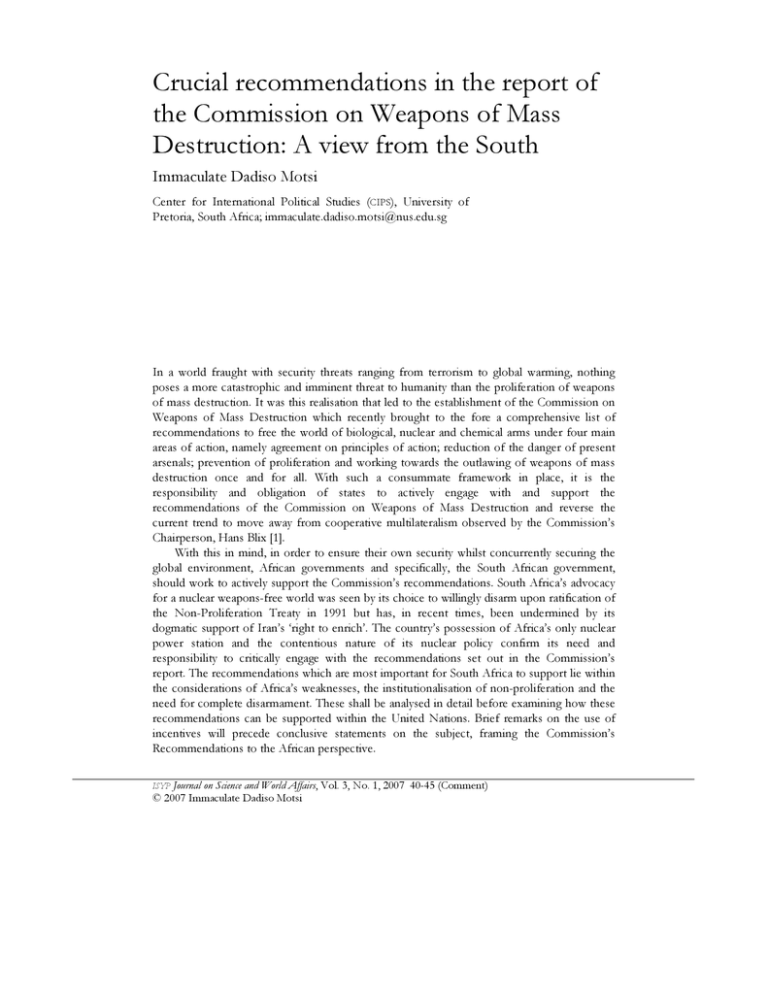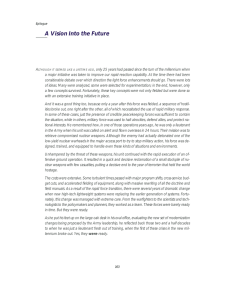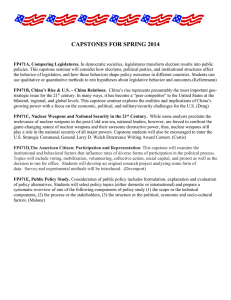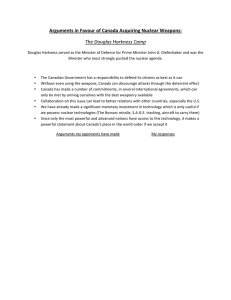Crucial recommendations in the report of
advertisement

Crucial recommendations in the report of the Commission on Weapons of Mass Destruction: A view from the South Immaculate Dadiso Motsi Center for International Political Studies (CIPS), University of Pretoria, South Africa; immaculate.dadiso.motsi@nus.edu.sg In a world fraught with security threats ranging from terrorism to global warming, nothing poses a more catastrophic and imminent threat to humanity than the proliferation of weapons of mass destruction. It was this realisation that led to the establishment of the Commission on Weapons of Mass Destruction which recently brought to the fore a comprehensive list of recommendations to free the world of biological, nuclear and chemical arms under four main areas of action, namely agreement on principles of action; reduction of the danger of present arsenals; prevention of proliferation and working towards the outlawing of weapons of mass destruction once and for all. With such a consummate framework in place, it is the responsibility and obligation of states to actively engage with and support the recommendations of the Commission on Weapons of Mass Destruction and reverse the current trend to move away from cooperative multilateralism observed by the Commission’s Chairperson, Hans Blix [1]. With this in mind, in order to ensure their own security whilst concurrently securing the global environment, African governments and specifically, the South African government, should work to actively support the Commission’s recommendations. South Africa’s advocacy for a nuclear weapons-free world was seen by its choice to willingly disarm upon ratification of the Non-Proliferation Treaty in 1991 but has, in recent times, been undermined by its dogmatic support of Iran’s ‘right to enrich’. The country’s possession of Africa’s only nuclear power station and the contentious nature of its nuclear policy confirm its need and responsibility to critically engage with the recommendations set out in the Commission’s report. The recommendations which are most important for South Africa to support lie within the considerations of Africa’s weaknesses, the institutionalisation of non-proliferation and the need for complete disarmament. These shall be analysed in detail before examining how these recommendations can be supported within the United Nations. Brief remarks on the use of incentives will precede conclusive statements on the subject, framing the Commission’s Recommendations to the African perspective. Journal on Science and World Affairs, Vol. 3, No. 1, 2007 40-45 (Comment) © 2007 Immaculate Dadiso Motsi ISYP Comment – Weapons of Mass Destruction: View from the South Most important recommendations for South Africa to follow and why In light of pertinence and relevance of each of the sixty recommendations brought forward by the Commission, South Africa’s choice of which recommendations to endorse must be based on an awareness of the uniquely African context. Africa’s weaknesses South Africa must support the recommendations that will most show Africa to be the global weak link in freeing the world from nuclear, biological and chemical weapons. The first of these is: 14. States must prevent terrorists from gaining access to nuclear weapons or fissile material. Since the events of September 11 2001, terrorism has become the greatest common threat to human security on the planet. The African Union believes that ‘this unfortunate development and all its evil manifestations around the world and particularly in Africa, undermine the most cherished values and fundamental principles of the 21st century including development, democracy, human rights, and freedoms’ [2]. As non-state actors, terrorist organisations operate outside the bounds of international law making the indiscriminate wielding of nuclear weapons highly likely; Mutually Assured Destruction ceases to be a factor when permanent geographical bounds cannot be delineated. This recommendation to prevent terrorists from gaining access to nuclear weapons must be supported by South Africa due to the fact that the capacity to achieve this goal by the use of methods such as the maintenance of fully effective accounting and control of all stocks of fissile material is absent in Africa. This can been seen by the International Community’s growing concern over the terroristharbouring potential of weak African states in light of the relative ease of unmonitored movement of people due to the porous nature of Africa’s borders. The existence of the forces such as the A.Q. Khan network whose supply-chain extends into North Africa and the numerous terrorist acts such as the US Embassy bombings in Nairobi, Kenya as well as the existence of dormant terrorist cells in failed African states such as Somalia are key points of note to justify this rising unease. The continent’s ability to prevent terrorists from gaining access to nuclear weapons is undoubtedly particularly limited and warrants further investigation and bolstering for the benefit of global security and as such, South Africa should support the Commission’s recommendation to prevent terrorists from gaining access to nuclear weapons. Africa’s second area of weakness is in the biological weapons sphere where it has been recommended that 35. Governments should pursue public health surveillance to ensure effective monitoring of unusual outbreaks of disease and develop practical methods of coordinating international responses to any major event that might involve bioweapons. 41 42 ISYP Journal on Science and World Affairs, Vol. 3, No. 1, 2007 The African continent is particularly vulnerable to the threat of bioweapons given the fact that should these weapons be unleashed on the continent, Africa has little to no capacity to identify, monitor and contain these weapons and has climate conditions conducive to the rapid spread and accumulation of viral and other infections. Currently, the governments in subSaharan Africa are in a state of panic over the potential Southern Migration of Bird Flu, which would pose a serious health risk to the poorly-equipped continent. In South Africa, the Department of Health has recently been put on high alert due to the outbreak of a deadly mutated strain of drug-resistant tuberculosis. The fact that a considerably large number of Africans are immuno-compromised also facilitates the rapid spread of bioweapons. The existence of such a weak link extends the threat of bioweapons to the global community at large given the airborne nature of these weapons and the increasing mobility of peoples across continental divides. In this way, South Africa needs to support this recommendation by starting to increase its biosafety standards within the framework of the new International Health Regulations of the World Health Organisation. Need for administrative and institutional frameworks The Commission’s report places great emphasis and value on cooperative action in which treaties and international organisations are indispensable tools in achieving our common goal of outlawing all weapons of mass destruction. In the African context, given the relative weakness of African states in the global political structure, African countries have no option but to rely on multi-national frameworks to address issues of mutual concern. South Africa’s engagement with the international community has often been within a multi-lateral framework and as such, like the Commission, the country has placed great value on the institutional framework within which global decision-making takes place. This is in light of the fact that in an increasingly globalising world, effective and binding decisions to contain common threats cannot take place outside a multilateral setting, indeed, as the Commission suggests, Global responses to the threat of proliferation have been the most effective. The country should therefore support the Commission’s recommendations which place high premium on the use of multi-lateral institutions to arbitrate and discuss modalities for mutually beneficial cooperation. These recommendations are; 8. States should make active use of the IAEA as a forum for exploring various ways to reduce proliferation risks connected with the nuclear fuel cycle. 42. States parties to the Chemical Weapons Convention should use the Organization for the Prohibition of Chemical Weapons as a coordinating center in the development of global standards for a chemical industry security culture. 4. The states party to the Non-Proliferation Treaty should establish a standing secretariat to handle administrative matters for the parties to the treaty. 60. The United Nations Security Council should make greater use of its potential to reduce and eliminate threat of weapons of mass destruction. Comment – Weapons of Mass Destruction: View from the South Towards complete disarmament The final category of recommendations that South Africa must support are those recommendations which lead towards complete nuclear disarmament; 20. All states possessing nuclear weapons must address the issue of their continued possession of such weapons. This recommendation should be at the heart of South Africa’s nuclear policy as the country has demonstrated that security can still be maintained without the possession of nuclear arms. Indeed, as the Commission projects: 30. All states possessing nuclear weapons should commence planning for security without nuclear weapons. They should start preparing for the outlawing of nuclear weapons through joint practical and incremental measures that included definitions, benchmarks and transparency requirements for nuclear disarmament. These two recommendations are at the very core of what the Commission on Weapons of Mass Destruction stands for and embody the commission’s ultimate vision. For this reason alone, all countries including South Africa, must work to actively endorse these steps towards the complete nuclear disarmament of the world. This is particularly true of volatile regions such as the Middle East where the threat of nuclear proliferation is particularly eminent given the historical animosity between Israel and the Arab bloc as well as the persistent displays of violence exhibited in the region. However, insistence on a nuclear-free Middle East for example cannot be morally or legally enforced as long as nuclear weapons continue to be present elsewhere. The presence of double-standards within the global community strikes at the heart of Africa’s concerns with the current global system and the deep sense of moral justice embodied in the religious tensions within the Middle East nuance the conflict to an elevated state of volatility. Conclusively, wherever they are housed, the world cannot be truly free from threat as long as nuclear, chemical and biological weapons still exist and as long as a single state is in possession of these weapons, the world can never be safe. Methods to promote these recommendations within the United Nations As the premier institution for international cooperation and engagement, the United Nations has a great role to play as a forum for the discussion and arbitration of matters of global concern, including the threat of nuclear proliferation. There are various methods through which South Africa can promote support for the above-mentioned recommendations within the United Nations. This is in light of the fact that the country has recently been awarded a two year non-permanent seat on the influential United Nations Security Council starting in January 2007. In this capacity, South Africa can work to push the agenda of the Commission on Weapons of Mass Destruction using its moral weight as a state which willingly gave up its own nuclear program to sway public opinion. The existence of specialised subsidiary bodies within the Security Council, including the UN monitoring, verification and inspection commission are also areas in which South Africa can actively endorse the recommendations of the commission within the United Nations. 43 44 ISYP Journal on Science and World Affairs, Vol. 3, No. 1, 2007 Other methods to sway policy and lobby within the United Nations are available. These include active debates within the General Assembly that bring the issue of nonproliferation to the fore. South Africa can also use its South-South cooperation networks to help set a collective agenda for the developing world geared towards the support of the abovementioned recommendations within the United Nations. The decision-making structure and modus-operandus of the United Nations has a wide scope of avenues for the tabling and critical engagement of issues of global concern. However, the most pertinent channel to address and promote the recommendations of the Commission is the International Atomic Energy Agency (IAEA) which deals specifically with matters of nuclear proliferation. The concert of agencies, subsidiary bodies, programs and funds, specialised agencies and departments within the secretariat of the United Nations can each be a pertinent forum for specific recommendations to be endorsed and championed. On the use of incentives A key area of concern is on the use of incentives as a deterrent against nuclear enrichment. Recommendation 38 for example, mentions that ‘state parties should continue to offer states positive incentives, including technical assistance, to join and implement the Chemical Weapons Convention’. I am alarmed that such a practice will set a dangerous precedent especially considering the rise in terrorism and the nature of ‘rogue states’. An illustrative case in point here would be the Iranian debacle. In June 2006 the United States, China, Russia, France, Germany and Britain offered Iran a comprehensive set of political and economic incentives to cease its enrichment of uranium [3]. Iran’s recent response issued in September 2006 shows how the use of incentives in this manner neutralises the deterrent effects of the threat of sanctions by giving Iran an alternative cause for ceasing enrichment. Should the incentives be taken up by Iran, the country, through effectively wielding the threat of nuclear proliferation, will come out of the incident having gained more than it would have had it not contemplated uranium enrichment in the first place. The precedent set in this case will be highly alarming as the threat of uranium enrichment can consequently be indiscriminately used by rogue states for the advancement of their own agendas in a manner akin to holding the world at ransom. I would therefore propose that incentives be removed from any negotiation package with states that pose a nuclear threat to send a clear message that such behaviour will not be rewarded or condoned in any manner and that the international community will always consistently take a firm stance on any attempts towards nuclear enrichment by any state in the future. Conclusion The greatest travesty in human history has been the manner in which over 128 million innocent lives were taken in the previous World Wars. These wars displayed man’s destructive capability and how this defies the considerations of constraint, reason and common humanity. This capability and the continued presence of sources of conflict amongst peoples dispels the myth of ‘democratic peace’ and nullifies the notion that nuclear arms merely serve as a disincentive for attack; these weapons have been wielded before and could once again be unleashed upon the world in the future. The potentially cataclysmic effects of such an action should be a driving force for the peoples of the world to unite against the continued existence Comment – Weapons of Mass Destruction: View from the South of nuclear arsenals in any shape or form. The Commission on Weapons of Mass Destruction provides an analytical framework within which states can engage in order to rid the world of the sceptre of nuclear arms. As Hans Blix states, ‘the commission has not aimed at utopian goals but has ardently and jointly sought to exercise judgment and point to constructive avenues out of difficulties, which are still with us’ [1]. It is for these reasons that people from all walks of life must support the recommendations put forward by the commission to leave future generations with a legacy of peace, security and constructive engagement in the resolution global challenges. Notes 1. 2. 3. H. Blix, Chairman’s prefix, in: Weapons of Mass Destruction Commission, final report, Weapons of Terror: Freeing the World of Nuclear, Biological, and Chemical Arms, Stockholm, Sweden, 1 June 2006. (http://www.wmdcommission.org). A. Konare, Preventing and Combating Terrorism in Africa, Commission of the African Union, 2005. (http://www.africa-union.org/Terrorism/terrorism2.htm). J. Anderson, Iran offers talks on nuclear issue, Washington Post Foreign Service, Wednesday September 13, 2006 Page A12. 45







